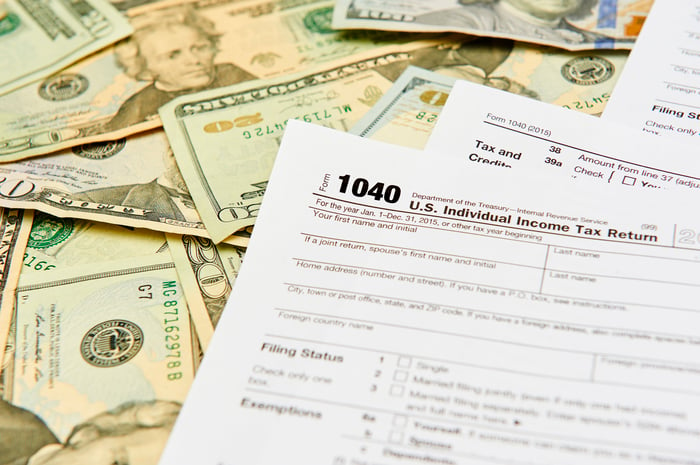On March 27, President Trump signed a $2 trillion economic stimulus package into law that includes a $1,200 payment for qualifying U.S. adults and $500 for qualifying children. But not everyone will be eligible for that windfall -- higher earners could see their stimulus payments reduced, or not get any stimulus money at all.
Here are the income thresholds for getting a full or partial stimulus payment:
|
Tax-Filing Status |
Income Threshold for Full Stimulus Payment |
Income Threshold for Partial Stimulus Payment |
|---|---|---|
|
Single |
$75,000 |
Under $99,000 |
|
Head of household |
$112,500 |
Under $136,500 |
|
Married filing jointly |
$150,000 |
Under $198,000 |
DATA SOURCE: CNBC.
Here's what this means. If you're single with no children, you're entitled to $1,200 if your earnings don't exceed $75,000. If they do, but they're less than $99,000, you'll receive some amount of money, but the closer you get to that $99,000, the less you'll receive.

IMAGE SOURCE: GETTY IMAGES.
Now, here's where things get interesting. The adjusted gross income your stimulus is based on will hinge on the last tax return the IRS has on record for you. And that's why it could pay to get moving on your 2019 return now.
When filing your taxes sooner makes sense
The deadline for filing 2019 federal tax returns -- and paying any associated amount you might owe the IRS -- has been pushed back by three months from April 15 to July 15. Many states are extending this deadline as well. Given the health crisis at hand, many Americans will no doubt take advantage of the opportunity to put off their taxes for another three months.
But here's why you may not want to do that: If you earned less money in 2019 than you did in 2018, filing a tax return will get that difference on record. And at that point, your 2019 income will be used to determine what stimulus payment you qualify for, as opposed to your 2018 income.
Now, let's imagine you're single and earned $82,000 in 2018, but in 2019, you only earned $73,000. That could spell the difference between getting a full stimulus payment or having that payment reduced, so if you're certain your 2019 earnings are lower than your 2018 earnings, it pays to file your taxes as quickly as you can.
Of course, if your 2019 income is higher than it was in 2018, then you'd be wise to hold off on submitting that tax return. But otherwise, get it in as soon as possible.
Another thing: If you're due a refund on your 2019 taxes, filing a return is the best way to get your hands on that money as soon as possible. And at a time when so many people are out of work or have seen their hours reduced, that's a very good thing. If you submit an electronic return, you could see your money within three weeks, especially if you sign up for direct deposit. That way, you won't have to deal with the possibility of your refund check getting lost in the mail, and that lump sum, together with your stimulus payment, could be crucial in getting you through this difficult time.




